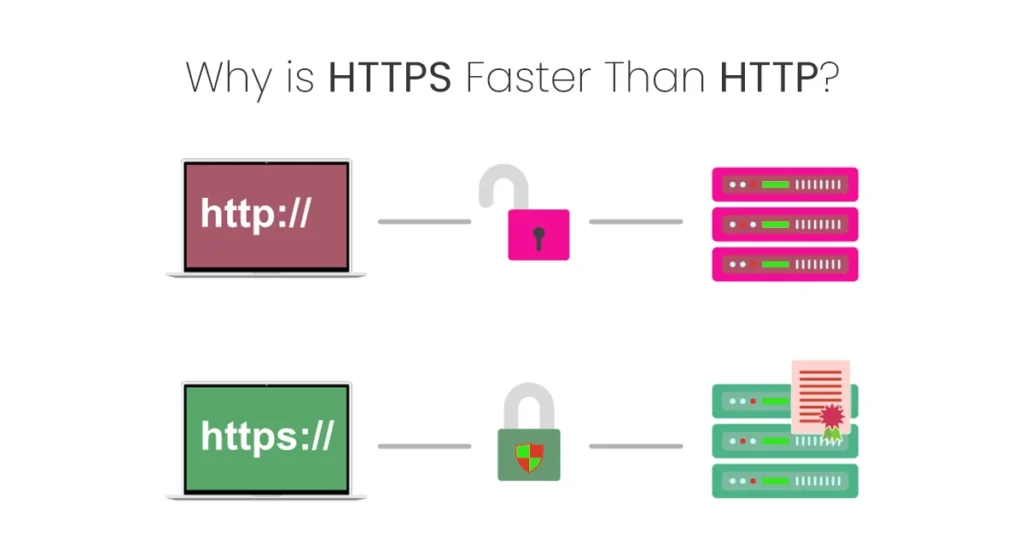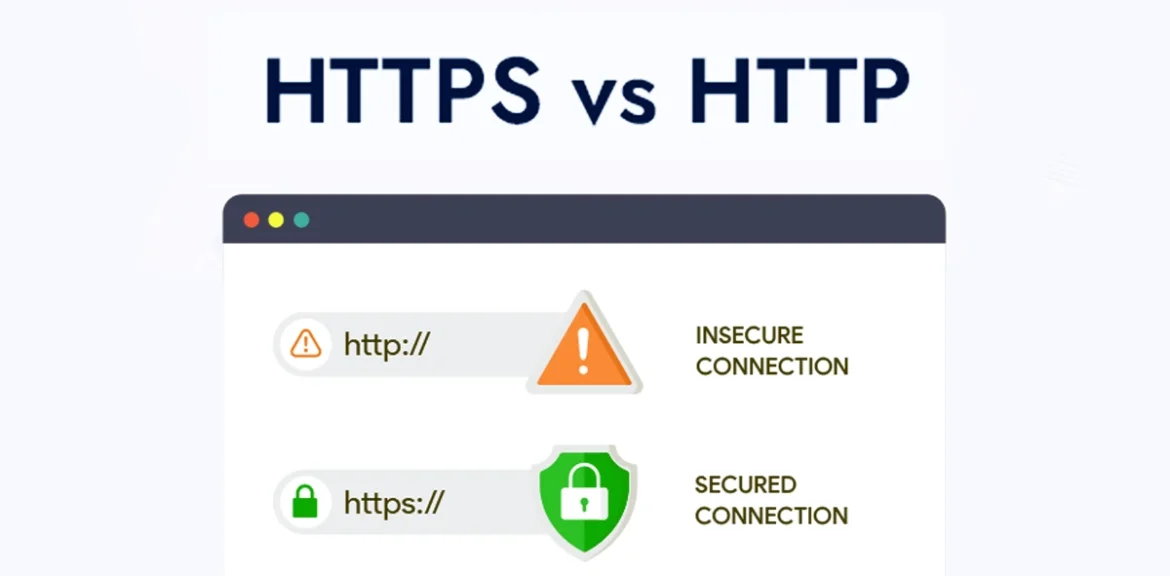Look back to the days of flip phones, dial-up internet, and Orkut; that is just how long HTTP is going to last in 2025. If it still clings to your site, not only are you behind everyone else, but you are endangering your data, search engine optimization (SEO) rankings, and client trust as well. In the meantime, HTTPS sets the new gold standard concerning speed, safety, and integrity.
This is no longer just for the tech giants now-there’s e-commerce startups, personal blogs, and everyone in-between to switch to HTTPS. The move is to remain relevant, trustworthy, and Google-approved-without being just a protocol upgrade. It’s a reputation upgrade.
Still thinking about possibly ignoring that extra ‘S’? A whole lot more and an even better search ranking, swifter performance, and the safety of critical data are probably being ignored. Let us analyze a few real discrepancies between HTTPS and HTTP, and why it is possible that sticking to an aging train may cost much more than one thinks.
What is HTTP and HTTPS? Full Forms Explained
First, though, we must keep this in mind: what HTTP and HTTPS stand for in full:
- HyperText Transfer Protocol is what stands for HTTP.
- HyperText Transfer Protocol Secure is what stands for HTTPS.
These two protocols tend to function in the process of data transfer between a user’s browser and a web server. The difference remains mainly in the “Secure” portion as to whether you need encryption by SSL or TLS.
Also Read: Static vs Dynamic Websites: Which One is Right for Your Business?
HTTPS vs HTTP: Understanding the Difference
Differences between HTTPS and HTTP can be classified into the following points:
Security
There is no comparison drawn without defining some terms with respect to HTTPS vs HTTP security. HTTP data is sent in plaintext, making it possible for third-party interception. Such unencrypted data can now lead to breaches, man-in-the-middle attacks, and identity theft.
HTTPS, on the contrary, encrypts the data using SSL/TLS protocols, ensuring that the information cannot be read or altered during transmission. This, in turn, provides confidentiality, integrity, and authentication.
Port Use
Looking at HTTPS vs HTTP port use:
- HTTP by default uses port 80.
- HTTPS uses port 443.
This port distinction becomes important when configuring firewalls or setting up servers.
Data Integrity
Information travelling over HTTP can be interfered with. HTTPS affirms that the information remains unchanged, providing integrity from point to point.
Authentication
The HTTPS protocol provides server verification, allowing verification of the actual website or entity being accessed. This is done through SSL/TLS Certificates, which are issued by trustworthy third-party Certificate Authorities (CAs). HTTP has no such verification mechanism.
SEO and Trustworthiness
Search engines, notably Google, provide a ranking advantage to HTTPS websites. Additionally, browsers like Chrome label HTTP sites as “Not Secure,” which may repel potential users. Thus, HTTPS is accredited and instills confidence in the users.
Why is HTTPS Faster Than HTTP?

While it is believed one speed is sacrificed for encryption, in most cases, HTTPS tends to be faster than HTTP due to modern performance optimizations like:
- Support for the HTTP/2 protocol (only available over HTTPS)
- Multiplexing (allows multiple requests in parallel)
- Header compression
- Persistent connections
All contribute to lowering latency and increasing loading speed. In practice, sites authorized by HTTPS are always faster than those running on HTTP, so speed is yet another reason in favour of HTTPS.
What is HTTPS Used For?
Today, HTTPS is not just for e-commerce or banking sites. It became a standard security protocol for any kind of site. These are its uses:
- Securing online transactions (payments, credentials, forms)
- Protecting user information—login credentials, personal information, etc.
- Establishing secure communication between applications and APIs.
- Complying with data protection regulations—GDPR, HIPAA, PCI DSS, etc.
From online blogs to SaaS platforms, HTTPS guarantees secure and private web interactions for all kinds of users and devices.
Should I Use HTTPS or HTTP?
This leads me to one such question: Should I use HTTPS or HTTP?
The answer is undeniably clear: Always use HTTPS.
Here’s why:
- Elevated security for you and your users.
- Boosted rankings on search engines thanks to Google’s algorithms.
- Browser compliance, with modern browsers tags HTTP as “Not Secure.”
- Trust from customers: The backbone of any business—credibility and engagement.
- Eligibility for future web features such as Progressive Web Apps (PWAs), which require HTTPS.
What Are the Disadvantages of HTTP?
Even though HTTP laid the foundation of the early web, today it comes with several disadvantages, among them being:
Encryption-less
The main reason why it becomes the worst factor about HTTP is that it sends the data in plain text, allowing interception by hackers.
Exposure to Attacks
Since it is not encrypted, it’s left vulnerable to man-in-the-middle (MITM) attacks, packet sniffing, and session hijacking.
No Authentication
There is a lack of any kind of authentication mechanism in HTTP, which makes phishing and spoofing very common.
Absence of Data Integrity
Any data exchanged over HTTP can be changed without either the user or the server being notified.
Reduced User Trust
Today’s users are well aware of the consequences. The ‘Not Secure’ sign on a website can chase potential customers away.
SEO Penalties
Those running websites in HTTP face penalties from search engines, which in turn lowers their visibility.
The Cost of Not Moving to HTTPS
Still thinking of switching? Here are some of the consequences of continuing with HTTP:
- Traffic Loss Because of Poor Visibility in SEO Rankings.
- Low Conversions Due to Lack of Trust Among Users.
- Increased Risk of Legal Liabilities in Case of Data Breach.
- New APIs and services are increasingly being designed to be only accessible through HTTPS.
Conclusion: HTTPS Is No Longer Optional—It’s the Standard
The debate of HTTPS vs HTTP is not merely technical; it is about security, performance, and above all, experience. With increasing sophistication in internet usage, an increasingly informed populace desires safer and faster interactions on the web. HTTPS meets those by providing robust encryption, better SEO, much faster speed, and increased trust.
With the question changed from “Will I use HTTPS or HTTP?” to “Why haven’t you switched to HTTPS yet?”, it is clear that the secure future of the internet lies in HTTPS.





